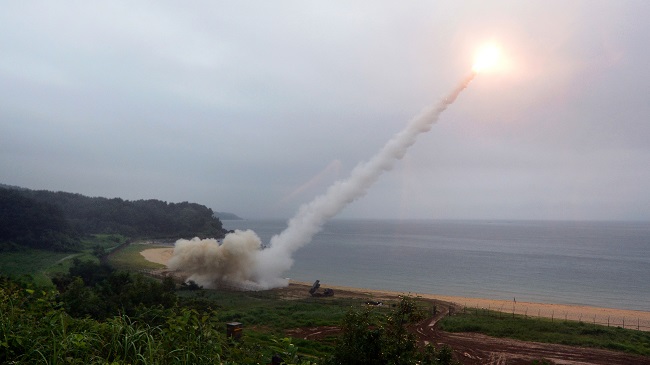
If you think Sen. Lindsey Graham’s (R-South Carolina) recent comments about the inevitability of an armed conflict between the United States and North Korea seems extreme, think again. The recent increase in the isolated nation’s testing of intercontinental ballistic missile systems, which some experts suspect can reach U.S. soil, has made the White House and its counterparts in Japan and China very nervous — if not outright combative. So despite State Secretary Rex Tillerson’s recent comments to the contrary, the U.S. military put its cards on the table early Wednesday with its own long-range missile test.
According to the New York Times, Pentagon officials oversaw the test-firing of an unarmed intercontinental ballistic missile from Vandenberg Air Force Base, located off the California coast just northwest of Santa Barbara. The Wednesday morning test was reportedly timed to attract the attention of North Korea and its chief ally in the region, China, whose analysts would have seen it in the early evening.
The day before, State Secretary Tillerson told reporters, “We do not seek a collapse of the regime, we do not seek an accelerated reunification of the peninsula, we do not seek an excuse to send our military north of the 38th Parallel.” Instead, the former Exxon executive noted, “We would like to sit and have a dialogue with them.” Tillerson then addressed North Korea directly by saying “we are not you’re enemy,” though he did stress they were “presenting an unacceptable threat to us and we have to respond.”
The latest escalation of tensions between the two countries came just as Air France released a statement regarding North Korea’s missile test on Friday. Following reports of the missile’s flying within 70 miles of a plane’s flight path, the company said, “North Korea’s missile test zones don’t interfere in any way” with Flight 293, which arrived at its destination “without any reported incident.” Even so, Air France stressed it “constantly analyzes potentially dangerous flyover zones and adapts its flight plans accordingly,” especially since North Korea typically doesn’t issue announcements or warnings prior to testing.
(Via New York Times and CNN)
